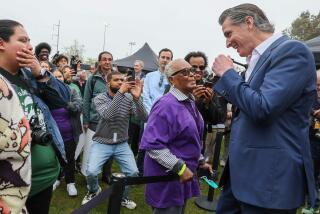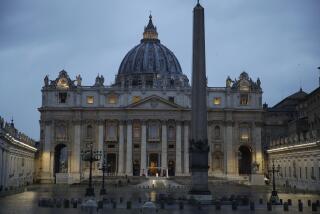A Call to All With ‘Ears to Hear’
- Share via
After months of preparation and much Hollywood hype, Los Angeles is braced for the visit of John Paul II. Media coverage has heightened the drama of his coming by concentrating attention on the protests and outcries of single-issue constituencies, both inside and outside the church.
Although such uproar usually leads to greater polarization and thus is self-defeating, it is hard to blame the dissenters. They have reasonable questions, real hurts; by daring to confront the Pope, they are sure to get attention. They do remind the church as a whole that somehow it has to listen and respond. The problem is an old one: How does any community safeguard the values and convictions that bind it together, while remaining open to change and greater service? Whatever their differences, however, sincere opponents owe one another courtesy, respect and patience.
Honesty demands that we try to grasp the full meaning of the Pope’s visit. He is not coming to provoke dissidence or to condemn anyone. Rather he comes to beg us all to be better human beings, with a special summons to Christians to become better Christians. I foresee the Pope’s challenge at work on at least four levels.
John Paul II will continue to emphasize the themes of his papacy: world peace and nuclear disarmament, collaboration to reduce poverty and hunger, the promotion of human rights and an end to oppression. He will proclaim the value of life, the dignity and rights of those who work, the sacredness of the family, the hope embodied in youth, and, above all, human solidarity. Because of our country’s resources, power and talent, the Pope will point out the special responsibilities of Americans, as individuals and as a nation, to take the lead in healing the world’s ills.
The Pope will also praise the political achievements of the United States and the vitality of the American church. Still, in his words and by his personal presence, he will try to get us to recognize our materialism, excessive individualism and lack of moral focus as well as the way these defects have infiltrated the American church. In our tendency to arrogance and blind self-confidence, we sometimes forget that the Pope is not an American, that he can reflect back to us a fresh appreciation of our strengths and weaknesses.
The Pope will have a spiritual message, inviting all of us to renew and deepen our faith. His activities will be shaped and styled to be signs that there is more to reality, including our own persons, than meets the eye; that there is transcendence in our lives. He will try to show us that the extraordinary is hidden within the ordinary. For the Pope believes that God is present and available to us, waiting to be discovered, encountered and embraced. And this will no doubt be carried out in a manner distinctly Catholic--through decorations and vestments, songs and dances, and spontaneity combined with solemnity.
Finally, the Pope will preach a biblical faith--centered on Jesus--not only to Catholics and other Christians, but to all men and women with “ears to hear.” One objective of his trip here is, unabashedly, evangelization, the proclamation of the gospel. But he will not propagandize or preach a watered-down version of the gospel. He will tell us to forgive our enemies (as he did his would-be assassin), to struggle always “to find a way to make good out of evil.” Most important, he will point to the person of Christ for all those who look for a model of human living, for all who search for God’s presence, word and action in human history.
Some people wonder why the 67-year-old Pontiff regularly leaves Rome to undergo the strain and grief of such journeys. Others are troubled by the amount of money spent--largely, I surmise, for protection against violence and for public safety. If, however, he is successful in his mission as I have described it, we have answers to these concerns. The Pope, more than any other leader on Earth, is positioned to call us to our senses, to remind us of our ideals, to bring human beings together.
I, for one, intend to enjoy the visit of Karol Wojtyla who, 2,000 years later, “walks in the shoes of the fisherman.”


